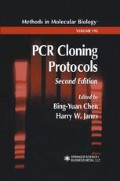Abstract
Current polymerase chain reaction (PCR) innovations provide powerful tools for the cloning of previously unknown genes as well as characterization of their functions. Examples of the latter used include PCR-mediated in vitro mutagenesis and recombination of the cloned genes. PCR approaches have become the method of choice to generate arrays of predefined mutations or recombination within the gene of interest. In the postgenomic era, these mutants or recombinants are highly desirable for the study of functional genomics, gene expression, protein structure-function relationships, protein-protein interactions, protein engineering, and in vitro evolution of enzymes.
Access this chapter
Tax calculation will be finalised at checkout
Purchases are for personal use only
References
Ling, M. M. and Robinson, B. H. (1997) Approaches to DNA mutagenesis: An overview. Analyt. Biochem. 254, 157–178
Mullis, K., Faloona, F., Scharf, S., Saiki, R., Horn, G. and Erlich, H. (1986) Specific enzymatic amplification of DNA in vitro: the polymerase chain reaction. Cold Spring Harbor Symp. Quant. Biol. 51, 263–273
Kammann, M., Laufs, J., Schel, J. and Gronenborn, B. (1989) Rapid insertional mutageneisis of DNA by PCR. Nucl. Acids Res. 17, 5404.
Ho, S. N., Hunt, H. D., Horton, R. M., Pullen, J. K. and Pease, L. R. (1989) Site-directed mutagenesis by overlap extension using the PCR. Gene 77, 51.
Sarkar, G. and Sommer, S. S. (1990) The ‘megaprimer’ method of site-directed mutagenesis. BioTechniques 8, 404.
Ochman, H., Gerber, A. S. and Hartl, D. L. (1988) Genetic applications of inverse PCR. Genetics 120, 621.
Ito, W., Ishinuro, H. and Kurosawa, Y. (1991) A general method for introducing a series of mutations into cloned DNA using the polymerase chain reaction. Gene 102, 67
Dulau, L., Cheyrou, A. and Aigle, M. (1989) Directed mutagenesis using PCR. Nucl. Acids Res. 17, 2873.
Jones, D. H. and Winistorfer, S. C. (1991) Site-specific mutagenesis and DNA recombination by using PCR to generate recombinant circles in vitro or by recombination of linear PCR products in vivo. Methods: Compan. Meth. Enzymol. 2, 2.
Shen, T. J., Zhu, L. Q. and Sun, X. (1991) A marker-coupled method for site-directed mutagenesis. Gene 103, 73–77.
Cadwell, C. and Joyce, G. F. (1992) Randomization of genes by PCR mutagenesis. PCR Meth. Appl. 2, 28–33.
Spee, J. H., de Vos W. M. and Kuipers, P. (1993) Efficient random mutagenesis method with adjustable mutation frequency by use of PCR and dITP. Nucl. Acids Res. 21, 777–778.
Majumder, K. (1992) Ligation-free gene synthesis by PCR: synthesis and mutagenesisi at multiple loci of a chimeric gene encoding OmpA signal peptide and hirudin. Gene 110, 89–94.
Horton, R. M. (1997) In vitro recombination and mutagenesis of DNA: SOEing together tailor-made genes, in Methods in Molecular Biology, vol. 67, PCR Cloning Protocols: From Molecular Cloning to Genetic Engineering (White, B. A., ed.), Humana, Totowa, NJ, pp. 141–150.
Stemmer, W. P. C. (1994) Rapid evolution of a protein in vitro by DNA shuffling. Nature 370, 389–391
Zhao, H., Giver, L., Shao, Z., Affholter, J. A. and Arnold, F. H. (1998) Molecular evolutions by staggered extension process (StEP) in vitro recombination. Nat. Biotechnol. 16, 258–261.
Author information
Authors and Affiliations
Editor information
Editors and Affiliations
Rights and permissions
Copyright information
© 2002 Humana Press Inc.
About this protocol
Cite this protocol
Shen, B. (2002). PCR Approaches to DNA Mutagenesis and Recombination. In: Chen, BY., Janes, H.W. (eds) PCR Cloning Protocols. Methods in Molecular Biology™, vol 192. Humana Press. https://doi.org/10.1385/1-59259-177-9:167
Download citation
DOI: https://doi.org/10.1385/1-59259-177-9:167
Publisher Name: Humana Press
Print ISBN: 978-0-89603-969-8
Online ISBN: 978-1-59259-177-0
eBook Packages: Springer Protocols

